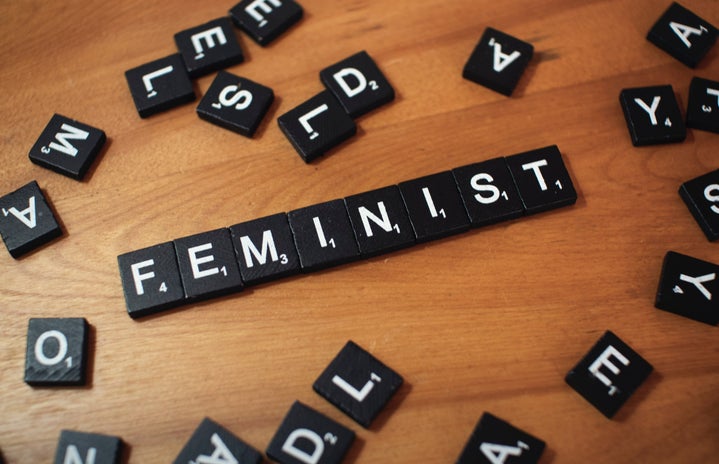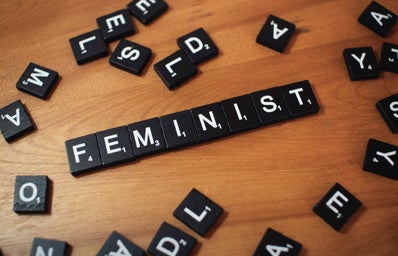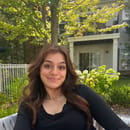Feminism, feminist, feminine; pink and red words that brush up feelings of pride, annoyance, or loudness in certain communities and minds. “Being a feminist” has become a sort of act one adopts in the modern world to try and strengthen their stance on an issue; a label we associate feelings with, directed towards those embellishing it. At the end of the day, it is merely a title, and whether we choose to identify by it or not is a choice that should be entirely individual. I can recall for the longest time, as a child, not even knowing what it meant to call oneself a “feminist.” Isn’t it the same as being feminine? No. A core memory I have is when I was in the seventh grade, sitting next to my best friend, in Pre-algebra, and after a minor argument, she asked me, “Tanvi, are you a feminist?” All I could answer with was, “I really don’t think so, I wouldn’t want to be,” truthfully speaking, all that went through my head when she asked me that question was the negative connotation of being “pro-female” in our functioning society. To my nascent 12-year-old mind, a feminist was an angry woman, wearing a white button-up turtleneck that loved to shout at men and make her voice heard. A feminist was a woman who spoke up and created misconstruction in a society that to me, at that time, seemed to be functioning well and fairly. Was she entertaining to side with when I argued about my experiences as a girl, yes. Did I believe in encouraging women and girls as equals even then, yes. Was this an accurate description at all of what the actual depth of being a feminist entails, absolutely not. At that time, I simply was not exposed enough to the agentic structure of the world, and that title seemed too definitive, almost too extreme for me, so in a moment of naive peacekeeping, I chose to respond with “no.” Today I am educated enough on the topic to most definitely say, yes, I think I’m a feminist, and I do not abide by the typical negative assumption of what a feminist “is.” I have lived life long enough to know that the world is not very fair towards women today and that there is a need to speak up and find our voice at times. In truth, the definition of a feminist is also personable; we customize that based on our own beliefs and values too, much like any other title we give ourselves (sister, friend, mother, etc.). Hence, we can choose what having that title means and have the tools to align it to our own actions and values too.
I think a common misunderstanding people have with the title of feminist itself is that they have these unspoken negative feelings towards it. In my mind, if we zoom out and focus on the word itself, breaking it down might be able to explain why this is so; “feminist,” combines the word feminine, which we associate with the characterization of being a woman, perhaps thinking of the stereotypical girly pinks, soft voices, maternal attitude, overall loving persona, etc., combined with the suffix “-ist,” which indicates a doing/doer. So together, “feminist” = “feminine behavior doer,”or in other words, for most of the general public, this is someone who acts characteristically female and hauls all positively associated stereotypes with that name in mind. In reality, we know that a feminist can also be someone who is well aware of the typical female stereotypes, and thus, this title could also kind of exemplify what they might stand against; it is now also used as a way to highlight the need for greater equality across genders, social, economic, and political in variety by directly addressing some part of said stereotypes. I can imagine that for youthful Tanvi not knowing this context might have played another part in my hesitation to regard myself as a feminist earlier.
When considering what else might have impacted my ability to firmly say, yes, I am a feminist, earlier on, I think my background always matters. Me and you, or you and anyone else will ultimately have different roots, no matter how similar or different we may seem, our foundational experiences are what alter our perspective in deeper ways. For me, growing up, my mother was constantly working, and trying to make her career, and my father actually raised me and my sister while working from home. Car rides to after-school activities and all meals and snacks were catered by my dad, and he handled all my hair care needs and girl drama with my friendships too. My father, as a parent to two daughters never once made me feel like I was less for being a girl. My own example of success was my mother, the breadwinner, and hard worker, she was powerful. So to me, having seen my father be the more maternal role model, and my mother be the more agentic leader in our familial setup, I think some part of me always associated being headstrong, with being a woman, and hence, the title of feminist might have also seemed somewhat redundant; I always assumed all women were typically respected for making their way into society. Obviously, after more exposure to the outside world beyond the walls of our home, I quickly understood that this simply was not the case. That no matter how many women, in families, or not, were like my mother, there were so many more that were afraid to break a stereotype and be authentic to themselves, in lieu of matching some false ideal of how a woman “should act” or how a woman “should be.” As the daughter of immigrants, this tightrope of being the ideal wife, or mom, or sister was broadly apparent to me in the interactions I observed within my cultural community. When immigrating to America, in the late 1990s, the expected initial role the immigrant woman assumes is a housewife role, at least until her husband is situated enough to where she can also start earning, or at least until her children are self-sufficient, hence, other families around me would follow this trope more seamlessly. All my friends had moms who stayed at home and dads who went to work. All of them thought that it was unfair when they couldn’t do what their brothers could do, play certain sports, play video games, have sleepovers, etc. but no one actually argued back, because that’s just the way things were. My sister and I were hyper-aware of this anomaly, and that led to the formation of our understanding of gender roles in our own community at a young age as well, which again, felt like something that was mutually understood between us; there was yet no knowledge of a label in existence that would identify us as possessing this understanding and wanting to make it change.
So I do wear a label, one that I seem to have adopted through time and days. It is one that I truly do feel captures some dainty aspect of the hope I have for the society that I am growing up in, and for the world which I have some hope of changing, even if it’s just by altering a small corner of it. The label no longer scares me, because I know I find value in wearing it, in my mind, or on my chest, you can call me, the modern feminist.


